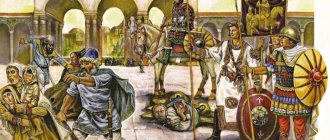Prayer books
- Orthodox prayer book. “The application contains morning and bedtime prayers, as well as prayers for Holy Communion in Russian and Old Church Slavonic. Created with the participation of the Pravoslavie.ru portal.”
Android
iOS
- Audio prayer book: Orthodox prayers, Bible, Gospel. Only morning prayers and selected troparia are free.
iOS
- Audio prayer book. . Only morning prayers are free
Android
- Dictionary of Church Slavonic language
Android
Orthodox library: books and media
- Orthodox library for everyone. The developer is the missionary department of the Moscow Diocese of the Russian Orthodox Church. A nice application with a fairly large archive of free literature (more than 1800 books), there are audiobooks.
Android
iOS
- Orthodox magazine "Thomas" is an interactive monthly magazine for mobile devices. The application is free.
Android
iOS
- Among the new products, we can note the Orthodox media library “Tradition ,” which was developed with donations from visitors to the portal “Predaniye.ru.”
iOS
PARISH LIBRARIES
Estimated reading time: 1 min.
Parish libraries - they exist in many places, but few people know about them. What's the use of them? Who visits them? Are they outdated in our Internet age and what are their prospects? We want to tell the readers of Thomas about all this.
- Tell me, do you have the Philokalia in your library? - Yes, but are you sure you will understand this book? Shouldn't we start with something simpler? “And they told me that this is the most important Orthodox book, that everyone is supposed to read it!” — Excuse me, but how long have you been going to church? Do you have experience reading spiritual literature? No? You know, I advise you to first read St. Theophan the Recluse, “What is spiritual life and how to tune in to it.” ...I heard such a dialogue in the parish library of the Moscow Church of the Icon of the Mother of God “Life-Giving Spring” in Tsaritsyno. But I could have heard it in other places. There are now many parish libraries, mostly ascetics work there, and the choice of a book often turns out to be a reason for long and serious conversations about faith. It can be said that such libraries de facto perform missionary and catechetical work. However, here’s a paradox: people most often do not know about parish libraries. And not only “outsiders” - sometimes even those who have been going to church for many years do not realize that their church has a library. Moreover, even the temple workers are not always aware. “Do we really have it?” — They answer the phone call in bewilderment. I became interested in the topic of parish libraries a year and a half ago, while preparing a selection of materials in “Foma” dedicated to the 200th anniversary of Gogol’s birth. It was then that I met Irina Vladimirovna Sergeeva, the head of the library of the spiritual center at the Church of the Life-Giving Spring icon in Tsaritsyno. And then I purposefully searched for information, communicated with both Moscow and regional librarians. By the way, my first stereotype that exploded was that almost all parish libraries are concentrated in Moscow and St. Petersburg. There is nothing like that - in Russia there are many wonderful libraries that are not inferior to those in the capital. But in Moscow, according to the portal “Orthodox Book of Russia” (www.pravkniga.ru), the situation is by no means ideal: there are about 400 church parishes - and only 20 parish libraries, and not all of these twenty are operational.
Who and why
The first and natural question is: why are they, parish libraries, needed at all? After all, a lot of Orthodox literature is now being published to suit every taste, many churches have bookstores and shops, and in the regular book trade it is not difficult to find Orthodox books. Why not just buy it? “Firstly, because books are expensive now, and not everyone can afford to buy everything they want,” answers Irina Sergeeva. — Secondly, and this is no less important, it is very difficult for people to navigate the abundance of books: what exactly is worth reading on a topic that interests them. Thirdly, every book read by a thoughtful reader becomes a reason to read something else. What exactly? Who will advise? That’s why they go to the library.” Who's coming, by the way? In most cases, parish library readers are either middle-aged women, students, or retirees. There are also unbaptized and unbelieving people among them - for example, students who are desperate to find the necessary literature for their diploma in ordinary libraries. Everyone has their own path to the parish library. Some saw an advertisement in a church, some were advised by friends, some (especially new Christians) by a priest, some by teachers. It is interesting that parish libraries are also actively used by students of theological seminaries - it turns out that the collections of parish libraries are sometimes no worse than seminaries.
What is there
What kind of literature can be found in the library at the temple? Of course, first of all, this is spiritual literature: dogma, asceticism, the works of the holy fathers, worship. But not only this - there are books on history, philosophy, art, there is literary criticism, there is classical fiction and even children's literature. And also Orthodox periodicals. The collections are sometimes huge even in comparison with secular libraries - for example, the Nizhny Novgorod library at the Alexander Nevsky Cathedral contains about 26 thousand books, and the library of the Church of the Life-Giving Spring icon contains 21 thousand (not counting periodicals). It is clear that in secular libraries the selection of religious literature is much smaller. But it’s not just about the number of books; it’s equally important how the library catalog is organized, how easy it is to find the right book or select literature on the right topic. After all, a library is not only a collection of books, but also an information retrieval system.
About problems
The words “information retrieval system” immediately evoke thoughts of computer databases and Internet search engines. However, in most parish libraries everything is like in the 19th century - a paper catalog, library cards. And the point is not that the computer is expensive. “Our main problem,” explains Irina Sergeeva, “is the lack of space. All our books are in two rooms, plus several cabinets in the hallway. We simply have nowhere to put computer equipment. If only we had a new premises...” Everyone I interviewed said the same thing. The problem with premises is much more acute than the problem of money. Sometimes philanthropists donate money, sometimes the parish pays for something - but there is simply nowhere to physically get new premises. So you have to put books on shelves not vertically, but horizontally, signing the title on the edge with a pen. This way it fits more. There's no time for computers here. However, there is not enough money either – neither to replenish funds nor to pay employees’ salaries. By the way, there are at best two or three employees, and more often there is only one. Sometimes librarians buy books with their own funds. However, parishioners often help by donating books. For example, in the library of the Church of the Life-Giving Spring icon, more than half of the new acquisitions are books donated by readers-philanthropists. Another problem, no less acute, is the lack of personnel. Not just anyone can work in an Orthodox library. The “obedience” option is not suitable here - deep professional knowledge is required. Moreover, the knowledge is not only library science, but also religious. Irina Sergeeva, who I have already mentioned more than once (by first education - a journalist, a graduate of the Faculty of Journalism of Moscow State University) specially received a second education, graduating from the missionary and catechetical faculty of PSTGU. Alas, there are few such people. There are, however, also pseudo-problems - for example, hypothetical competition from digital libraries. More than once I have heard the opinion that the time of parish libraries has already passed. Like, almost any Orthodox book can be found on the Internet... I asked all the librarians with whom I spoke to comment on this. None of them see anything terrible in electronic versions of books, but they are all confident that paper books will be in demand by readers for a very long time. “They won’t leave us on the Internet,” Irina Sergeeva smiled in response to my question. “On the contrary, it happens that they come to us from the Internet.”
*** We can talk endlessly about the problems of parish libraries. But, despite all their problems, they still exist, many people use their help, and thanks to them, both the religious and general cultural literacy of the people are growing. And all this is done through the labors of very few ascetics. How can we - that is, society - help them? Let's think together.
*** “In addition, it is important that libraries at diocesan administrations, large city parishes and monasteries open or intensify their activities. A church library should be not only a place where people come to read or borrow a book, but also a spiritual and educational center where groups of lovers of Christian education and discussion circles are organized. If things are done correctly, people will come here who, perhaps, rarely go to worship. And such communication will be a step towards the Church for them.”
From the report of His Holiness Patriarch Kirill of Moscow and All Rus' at the Bishops' Conference on February 2, 2010
photo by Vladimir Eshtokin










